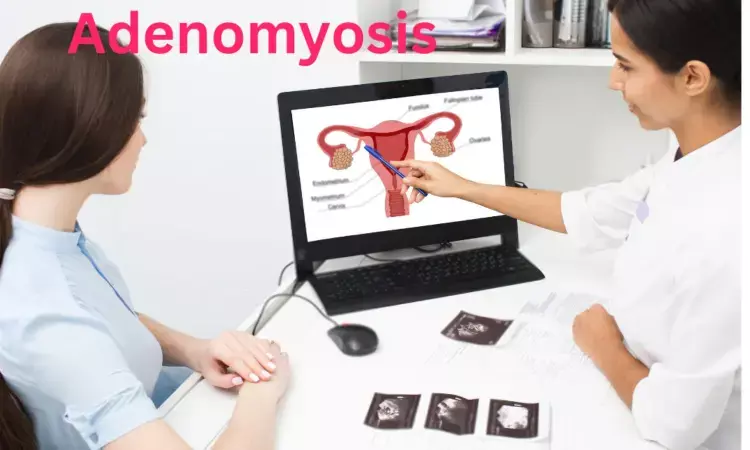- Home
- Medical news & Guidelines
- Anesthesiology
- Cardiology and CTVS
- Critical Care
- Dentistry
- Dermatology
- Diabetes and Endocrinology
- ENT
- Gastroenterology
- Medicine
- Nephrology
- Neurology
- Obstretics-Gynaecology
- Oncology
- Ophthalmology
- Orthopaedics
- Pediatrics-Neonatology
- Psychiatry
- Pulmonology
- Radiology
- Surgery
- Urology
- Laboratory Medicine
- Diet
- Nursing
- Paramedical
- Physiotherapy
- Health news
- Fact Check
- Bone Health Fact Check
- Brain Health Fact Check
- Cancer Related Fact Check
- Child Care Fact Check
- Dental and oral health fact check
- Diabetes and metabolic health fact check
- Diet and Nutrition Fact Check
- Eye and ENT Care Fact Check
- Fitness fact check
- Gut health fact check
- Heart health fact check
- Kidney health fact check
- Medical education fact check
- Men's health fact check
- Respiratory fact check
- Skin and hair care fact check
- Vaccine and Immunization fact check
- Women's health fact check
- AYUSH
- State News
- Andaman and Nicobar Islands
- Andhra Pradesh
- Arunachal Pradesh
- Assam
- Bihar
- Chandigarh
- Chattisgarh
- Dadra and Nagar Haveli
- Daman and Diu
- Delhi
- Goa
- Gujarat
- Haryana
- Himachal Pradesh
- Jammu & Kashmir
- Jharkhand
- Karnataka
- Kerala
- Ladakh
- Lakshadweep
- Madhya Pradesh
- Maharashtra
- Manipur
- Meghalaya
- Mizoram
- Nagaland
- Odisha
- Puducherry
- Punjab
- Rajasthan
- Sikkim
- Tamil Nadu
- Telangana
- Tripura
- Uttar Pradesh
- Uttrakhand
- West Bengal
- Medical Education
- Industry
Isolated Adenomyosis Linked to Fewer Systemic Comorbidities Compared to Coexisting Endometriosis: Study Shows

Italy: A recent prospective observational study, published in Reproductive BioMedicine Online, sheds light on the systemic health profile of women diagnosed with adenomyosis. Led by Dr. Angela Gallone from the University of Florence and Careggi University Hospital, Italy, the research explored the prevalence of systemic comorbidities in women with isolated adenomyosis compared to those who also have endometriosis.
"Recent findings reveal that premenopausal women (aged 20–50) with isolated adenomyosis have a lower prevalence of systemic comorbidities compared to those with coexisting endometriosis," the researchers reported. "Autoimmune disorders were observed in 14% of the adenomyosis-only group versus 24% in those with both conditions, while stress and pain-related disorders affected 30% and 47% of the respective groups. Notably, the presence of endometriosis significantly raised the risk of comorbidities (OR 1.65)."
Adenomyosis, a benign yet chronic uterine disorder, is known to cause symptoms like painful menstruation, heavy bleeding, and infertility. It frequently overlaps with conditions like endometriosis and uterine fibroids, often complicating diagnosis and management. While the systemic effects and associated comorbidities of endometriosis have been extensively studied, there is limited data available for adenomyosis in isolation.
To bridge this knowledge gap, researchers enrolled 689 premenopausal women aged between 20 and 50 years, excluding individuals with malignancies. Among them, 342 had adenomyosis alone, while 347 were diagnosed with both adenomyosis and endometriosis. The diagnosis was confirmed through imaging techniques or surgical procedures. Comorbidities were grouped into two categories: autoimmune disorders and stress- or pain-related conditions.
The study revealed the following findings:
- Women with only adenomyosis had significantly fewer systemic comorbidities than those with both adenomyosis and endometriosis.
- Autoimmune disorders were present in 14% of the adenomyosis-only group compared to 24% in the group with both conditions.
- Stress and pain-related disorders were reported by 30% of women with isolated adenomyosis versus 47% in those with coexisting endometriosis.
- Women over 35 years old with only adenomyosis had a lower incidence of autoimmune disorders compared to those with both conditions.
- Endometriosis was independently associated with a higher risk of systemic comorbidities (OR = 1.65).
The study emphasizes a crucial distinction between the two conditions. Although adenomyosis and endometriosis often share clinical features and can co-exist, they exhibit different systemic profiles. Endometriosis appears to behave more like a multi-system syndrome, whereas adenomyosis seems to be a more organ-confined condition when it occurs alone.
Despite the lower burden of comorbidities, the authors emphasize the importance of a holistic and multidisciplinary approach to managing adenomyosis. Even in the absence of endometriosis, some patients may present with other chronic conditions that require attention.
The researchers call for more comprehensive epidemiological studies to better understand the biological mechanisms underlying these differences. Improved knowledge in this area could pave the way for more personalized, targeted treatments for both adenomyosis and endometriosis.
Reference:
Gallone, A., Vannuccini, S., Manzi, V., La Torre, F., Toscano, F., Giani, M., Fambrini, M., Chedraui, P., & Petraglia, F. (2025). Systemic comorbidities in patients with adenomyosis. Reproductive BioMedicine Online, 105102. https://doi.org/10.1016/j.rbmo.2025.105102
Dr Kamal Kant Kohli-MBBS, DTCD- a chest specialist with more than 30 years of practice and a flair for writing clinical articles, Dr Kamal Kant Kohli joined Medical Dialogues as a Chief Editor of Medical News. Besides writing articles, as an editor, he proofreads and verifies all the medical content published on Medical Dialogues including those coming from journals, studies,medical conferences,guidelines etc. Email: drkohli@medicaldialogues.in. Contact no. 011-43720751


